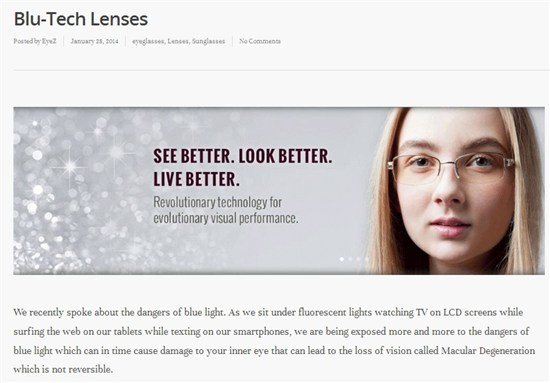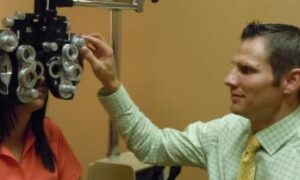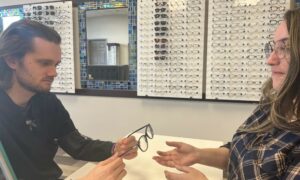By Mary E. Boname, OD, MS, FAAO
SYNOPSIS
Blue light from electronic devices and light bulbs is increasingly prevalent in our lives—and part of blue light can be harmful. Educate your patients on risks,and guide them to products that protect their eyes from potential damage.
ACTION POINTS
EDUCATE YOURSELF & PATIENTS. Blue light causes gradual oxidative damage to the macula, eroding cellular functions and increasing chances of macular degeneration. Blue light also causes blinding glare, discomfort and poor visual contrast.
ILLUSTRATE WITHDATA & MATERIALS. Share scientific findings, photos of harmed macula, and presentbenefits of nutritional supplements.
RECOMMEND DEVICE & EYEWEAR SOLUTIONS. Lower brightness of devices and prescribe BlueTech Lenses.
There is increasing concern that blue light from devices such as smartphones and tablets can lead to damage to the retina and macula. Here is how I am educating my patients about this emerging risk and how to help prevent it with protective eyewear and smarter device use.
Blue Light Research
Click HERE to access Harvard Medical School’s study: “BlueLight Has A Dark Side.”
Educate Yourself–and Patients
Blue light is a short wavelength (< 400 nm) light that scatters more than other wavelengths of light, resulting in a blue haze. Blue light, which can be beneficial during the daylight hours because it boosts attention, reaction time and mood, is the most disruptive at night, when it throws the body’s biological clock (circadian rhythm) out of whack. Sleep suffers. Worse, research shows that it may contribute to the causation of cancer, diabetes, heart disease and obesity.
You encounter blue light in everyday activities. Fluorescent lighting, electronic screens (phones, tablets, computers, TVs, etc), and the sun emit damaging high-energy blue light. Blue light causes gradual oxidative damage to the macula over your lifetime eroding cellular functions needed to keep this delicate tissue healthy, leaving eyes susceptible to developing macular degeneration. Additionally, blue light impacts your daily vision at any age causing blinding glare, discomfort and poor visual contrast.
I always ask patients about their visual demands at work and at leisure. We have a discussion about the risks of cumulative exposure to blue radiation, and I tell them that the greatest threat to the health of their eyes and their vision is indoors: indoor lighting and constant computer usage.
In addition to my in-office education, I blog about the dangers of blue light, and I have lectured at a national conference on Macuhealth and BluTech lenses.
One of the ways Dr. Boname educates patients about the dangers of blue light, and how to prevent it, is through her blog. The entry pictured above explains the usefulness of harmful blue light-blocking BluTech lenses.
Use Educational Materials, Data
I begin by saying that it is common knowledge that we need to protect our skin and our eyes from harmful UV radiation (sunlight), but most people are unaware that the greatest threat to our eyes and our vision is indoors: indoor lighting and chronic computer use, through which we are exposed to blue radiation. Cumulative exposure to blue radiation (without protective BluTech lenses) has been linked with an increased risk for AMD. I have a laminated informational sheet that shows pre- and post- treatment (with Macuhealth) photos of patients with AMD.
The photographs demonstrate a reversal of dry macular changes with one Macuhealth gel tab/day over the course of nine months, a year and three years. On the flip side there is a list of published scientific research on Macuhealth. I encourage patients who are in doubt to read the literature. There is tremendous scientific data to support the claims made by Macuhealth. In fact, it is approved for use by healthy patients without any evidence of AMD or risk factors for it. Macuhealth has been shown to increase contrast sensitivity and improve night driving in those who take it. The Canadian Olympic team took it to enhance their visual performance in Sochi.
Recommend Device Solutions and Eyewear
I recommend the patient lower the brightness on their iPhone and iPad. In addition, I prescribe BlueTech lenses, like the ones I wear myself. BluTech lenses shield your eyes from blue radiation while you are using a computer, watching television or reading books on an e-reader. BluTech lenses are infused with the precise balance of ocular lens pigment and melanin to give your eyes the optimum defense against harmful light spectrums.
I begin by educating patients on limiting their use of the computer in the evening hours, and I prescribe BluTech lenses for ALL computer tasks and wear them myself in the office all day. Companies are also working on technical solutions. In 2005, after conducting early studies on the effects of blue light on sleep, researchers at John Carroll University in Ohio formed a spin-off company called Photonic Developments to market products that can mitigate blue light exposure. These include orange-tinted glasses, screen filters, and blue-light-free bulbs, all sold at LowBlueLights.com.
Blue Light: Key Educational Points
Nearly all electronic devices and energy-efficient light bulbs emit blue light. Blue light is emitted from all computers, iPhones, iPads, laptops, televisions, high-energy efficient light bulbs, etc. We are exposed to it nearly all day long, every day. Blue radiation is outdoors, as well (and BluTech offers “outdoor” lenses), but the exposure from computer screens and televisions is greater because we generally are much closer to them than we are to the blue sky, and that makes the level of radiation we are exposed to more intense.
Blue light lowers melatonin levels in the brain. In 2010, Harvard Medical School did a study looking at the melatonin (sleep hormone) levels in patients exposed to blue radiation. The more exposure to blue radiation a patient had (computer usage), the lower the amount of melantonin in their bodies. The more sleep-deprived we are, the more cancer, diabetes, hypertension, heart disease and depression we have.
BluTech lenses are the external protection from blue radiation. Macuhealth is the internal protection from blue radiation. “An ounce of prevention is worth a pound of cure,” the old saying goes.
If you have a positive family history of AMD, you should take Macuhealth, even if you yourself do not have it. Reduce your modifiable risk factors for AMD: stop smoking, eat more fruits and vegetables (especially those containing Lutein, Mesozeaxanthin, and Xeazanthin), Exercise, and be sure to have annual comprehensive eye examinations.
Related ROB Articles
Meet the Growing Challenge: Treating Macular Degeneration
OD’s Device Advice: Help Patients Optimize Use of Electronic Devices
Computer Eyewear: Provide Relief from Computer Vision Syndrome
Mary E. Boname, OD, MS, FAAO, is the owner of Montgomery Eye Care, P.A., in Skillman, NJ. To contact her: mboname@mecnj.com.


























